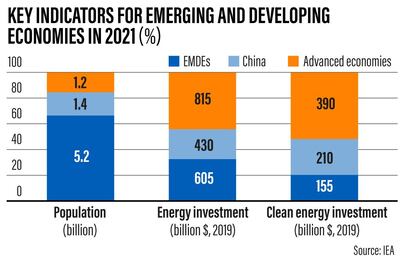The world needs up to $1 trillion worth of clean energy financing by 2030 to help developing economies meet net-zero emissions targets by 2050, according to the International Energy Agency.
The requirement is nearly seven times the $150 billion spent on aiding energy transition by emerging and developing economies last year.
Spending on renewables fell 8 per cent last year, according to the Paris-based agency, which expects a rebound in 2021.
A surge in spending is expected to bring major economic and societal benefits but would require "far-reaching efforts" to improve domestic environment for clean energy investment, the agency said in its report Financing Clean Energy Transitions in Emerging and Developing Economies.
“In many emerging and developing economies, emissions are heading upwards while clean energy investments are faltering, creating a dangerous fault line in global efforts to reach climate and sustainable energy goals,’’ said Fatih Birol, the IEA's executive director.
“Countries are not starting on this journey from the same place – many do not have access to the funds they need to rapidly transition to a healthier and more prosperous energy future – and the damaging effects of the Covid-19 crisis are lasting longer in many parts of the developing world," he added.
Energy-related carbon dioxide emissions from developing countries in Asia, Africa, and Latin America are set to grow by 5 billion tonnes over the next two decades, complicating efforts to reach global carbon neutrality by 2050.
Countries around the world are being urged to abide by the Paris Agreement, which looks to restrict carbon emissions to well below 2°C (35.6°F) above pre-industrial levels, preferably about 1.5°C.
Several countries have adopted a net-zero policy. South Korea and Japan pledged to become carbon neutral last year. The US, the world’s biggest fossil-fuel producer, also plans to reach carbon neutrality.
The IEA said efforts undertaken by financial institutions, donors, and multilateral banks to alleviate climate change-related risk factors were not enough.
"It is clear that we are nowhere near mobilising the level of funds that will be needed," the agency cautioned.
"This is why one of the most urgent recommendations is that governments give international public finance institutions a strong strategic mandate to finance clean energy transitions in the developing world," the report said.
The call comes amid concerns that the developing world, which remains largely unvaccinated and still in the grips of different waves of the Covid-19 pandemic, is likely to be left behind in energy transition.
Developing economies have seen their debt burden rise and are spending overwhelmingly on containing a rapidly evolving health crisis. Countries remain cash-strapped and are in urgent need of vaccines and medical supplies, leaving little resources left to finance their energy transition.
The impact of the pandemic on the developing world, could set countries back by years and lead to the adoption of more polluting and cheaper fuels such as coal.
Last month, the IEA caused a stir among Asian economies by urging countries to curb new fossil fuel investments and limit sales of internal combustion engine passenger cars to achieve their net-zero targets by 2050.
The agency's roadmap to carbon neutrality calls for no new investment in fossil fuel supply projects and no further final investment decisions in new unabated coal plants, which use the fuel without lowering its carbon impact.
The IEA's calls resonated with US climate envoy John Kerry, who reprimanded multilateral institutions such as the World Bank for financing coal.


